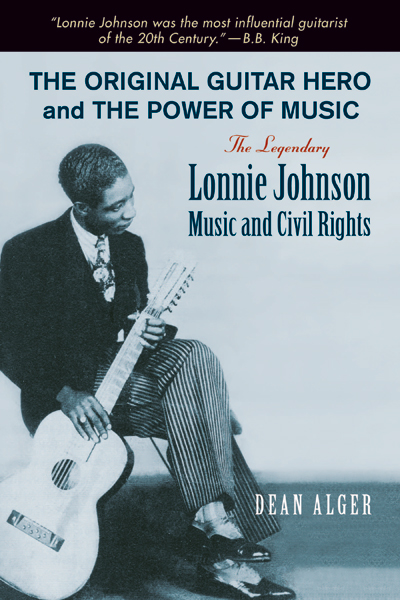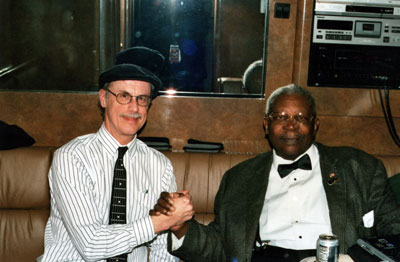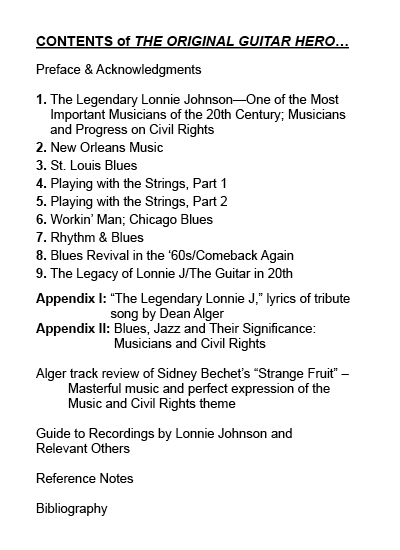
| THE ORIGINAL GUITAR HERO and THE POWER OF MUSIC
The Legendary Lonnie Johnson, Music and Civil Rights |
Major book by Dean Alger/“Dr. D” And see below for Book Tour & companion CD – and in-process documentary film: |
 |
 |
|
Photo taken at the end of our interview for the book. |
|
Documentary Film (largely based on the book but with broader themes) THE ORIGINAL GUITAR HERO and THE POWER OF MUSIC Film Website: www.originalguitarherofilm.com |
 |
|
NOTE: The book is about much more than an old musician biography: It discusses the nature of the guitar, how artistry on the guitar developed, and how it became the dominant instrument in popular music and a cultural icon. And it reviews the inspiring, vital story of how Blues and Jazz, and other music spawned by them, plus the great musicians involved, played a major role in progress on Civil Rights. The book is about “The Power of Music,” on multiple levels. WHERE TO GET THE BOOK: Best place in the Twin Cities: SubText Books (http://www.subtextbooks.com/ ; 651-493-2791) “The Ultimate Best of Lonnie Johnson” CD – close companion to the book I compiled this CD as a closely coordinated companion to the book. It’s prominently noted in chapter 1, the tracks are cited by track number as they’re reviewed through the book, most are given feature attention, and key points in the book are related to the CD. The CD compilation is deeply thought through. It’s designed to bring a wider range of people in. The first 7 tracks are all masterpieces, spanning Lonnie’s career, but are very accessible to a wider audience. Then it’s chronological. Chicago’s Grammy-winning record producer Richard Shurman said: “The CD is wonderful. It’s very well compiled and balanced and showcases Lonnie’s greatness beyond question.” Listening to the CD, while reading the book, greatly enhances the experience of both! But, due to failures of traditional record companies, I’m offering this CD in non-traditional manner. If you would like a copy (for a very reasonable price, plus postage), e-mail me at DrDmusic@earthlink.net , OR come to one of my book tour appearances. THE POWER OF MUSIC Book Tour, April 22, Tuesday, St. Paul, Minnesota: SubText Books - April 23, Wednesday, Chicago area: Barbara’s Books, Burr Ridge store, 6-7:00PM www.barbarasbookstore.com April 24, Thursday: St. Louis: Subterranean Books, 6-7:00PM April 26-28, Saturday-Monday: NEW ORLEANS JAZZ & HERITAGE FESTIVAL April 29, Tuesday, Oxford, Miss.: Talk on the book & Lonnie Johnson at The Blues Archive, University of Mississippi, Curator: Greg Johnson. May 1-May 2, Thursday-Friday, Cincinnati: Booksellers on Fountain Square, downtown. |
B.B. King: “Lonnie Johnson was the most influential guitarist of the 20th century.”
Bob Dylan (liner notes for famous box set, Biograph): “I was lucky to meet Lonnie Johnson at the same club I was working [Gerde’s Folk City in Greenwich Village, New York. 1961] and I must say he greatly influenced me. You can hear it in [The Freewheelin’ Bob Dylan]. I mean, “Corrina, Corrina,” that’s pretty much Lonnie Johnson. I used to watch him every chance I got and sometimes he’d let me play with him.” [Also see pages 157-158 in Dylan’s memoir, CHRONICLES, Volume One for Dylan on how Lonnie taught him a style of guitar-playing that he later adopted, and on his appreciation of Lonnie’s greatness.]
Ry Cooder: “Lonnie Johnson was one of the transcendent people who influenced everybody.”
Bill Wyman (former Rolling Stones bass player, in Bill Wyman’s Blues Odyssey): “Lonnie Johnson was a guitar legend before we knew what they were. You can trace his playing style in a direct line through T-Bone Walker and B.B. King to Eric Clapton.”
Chet Atkins (greatest & most important guitarist in Country Music history): “A Black musician I listened to and admired was Lonnie Johnson, one of the great guitar improvisers of his time.”
Jack Wilkins (superb jazz guitarist & Manhattan School of Music teacher, from our interview): “Listening to the music of Lonnie Johnson is like listening to the history of jazz guitar… His solo recordings are proof that he could play guitar like no one before him. In his recordings with Eddie Lang he was the first to play fully developed jazz lines.”
RAVE ENDORSEMENTS:
Lawrence Cohn, former Vice President of Columbia/Epic Records, Grammy-winning producer of “Robert Johnson – The Complete Recordings,” editor of, Nothing But The Blues:
“This book is great! Besides the superb review and assessment of Lonnie Johnson’s music and life, the perspective on development of artistry on the guitar and broader societal impacts make this a profoundly meaningful book. Lonnie Johnson’s importance for 20th century music is monumental; this book is long over due in spelling out why.”
Barry Mazor, author of Meeting Jimmy Rodgers and the forthcoming Ralph Peer & the Making of Popular Roots Music, says of the book:
“As both guitarist and vocalist, Lonnie Johnson was massively influential in blues, jazz and American pop, yet he’s been undervalued and undersung. Dean Alger’s deep, lively biography goes a long way towards correcting that, and provides perspective with adventurous, heartfelt riffs on the music and its context along the way.“
Steven C. Tracy, Professor of Afro-American Studies, University of Massachusetts, author of Going to Cincinnati: A History of the Blues in the Queen City, etc., and a fine musician, says:
“In THE ORIGINAL GUITAR HERO & THE POWER OF MUSIC – The Legendary Lonnie Johnson, Music & Civil Rights Dean Alger offers the long overdue biography of one of the true geniuses of 20th century music. Alger has collected material from extensive research and woven it into a narrative that rightly presents the real Lonnie Johnson in the appropriate light of an unjustly underrated and neglected superstar.
Fascinatingly readable, the book goes even further in that it places Johnson in the broadest context of American culture of the 20th century, seeing him rightly not only as a trailblazer and pervasive influence on a variety of musical genres — jazz, blues, rhythm and blues, country, rock, and folk — but as an important symbol of race relations, racial understanding, and racial progress in the American century. If this volume doesn’t bring Johnson his rightful place in American musical and historical discussions, and a spot in the Rock and Roll Hall of Fame, then grits ain’t groceries and Mona Lisa was a man.”
Reviewer “Mark Twain, Jr.” on Amazon.com (Philadelphia record producer Aaron Levinson): “A work of extraordinary research and scholarship. So little was known of his life that this book will for years play a pivotal role in contextualizing the contribution that Lonnie Johnson made as an artist and figure of historic significance in the 20th century. My hat is off to Dean Alger who has done more than anyone else to illuminate this supremely talented yet enigmatic person. The writing is strong and vivid. I cannot recommend this book with greater enthusiasm.”
RAVE BOOK REVIEWS:
Review by former Editor Paul Trynka in MOJO; Trynka is author of Brian Jones——The Making of the Rolling Stones (2014)):
5 Star Review. Intro/sub-heading: “First Lonnie biog aims to restore his reputation as one of the most influential guitarists—ever.”
“This ambitious book sets out to place Lonnie Johnson as a cross-cultural visionary in the veins of Charlie Christian or Jimi Hendrix, and succeeds brilliantly. With a lucid explanation of Johnson’s music, plus many anecdotes both poignant and inspiring, this excellent biography does full justice to an underappreciated musical titan.”
Review by Gerard Herzhaft in SOUL BAG (leading Blues, R&B magazine in FRANCE):
Many biographies of great bluesmen have been published, but we should particularly celebrate THE ORIGINAL GUITAR HERO and THE POWER OF MUSIC - The Legendary Lonnie Johnson, Music and Civil Rights, about a principal creator of modern blues. This is a beautifully written, richly documented volume.
“Alger obviously dedicated a tremendous amount of time to consulting hundreds of sources and to listening carefully to Johnson’s rich and prolific art… After recounting the immense respect his peers had for his talent, Alger illuminates Johnson’s undeniable influence on T-Bone Walker, B.B. King and numerous other guitarists, including Eric Clapton. Alger’s lively writing makes even the recording sessions interesting. This is one of the best biographies of a bluesman.”
BOOKLIST:
“Though recognized by B.B. King and others for his strong influence, blues- and jazz-guitar pioneer and singer Lonnie Johnson is an underappreciated giant of the music. By bringing the music back along with commentary, Alger makes a substantial contribution to the history of early jazz, of the guitar’s preeminence in 20th century music, and of Johnson’s major role.”
Petition submitted to The Recording Academy – for 2017, 2018 & 2019 Grammys event. Let the Grammy Folks know they must do this!: http://www.grammy.com/contact
A LIFETIME ACHIEVEMENT GRAMMY AWARD FOR LONNIE JOHNSON
B.B. King: “Lonnie Johnson was the most influential guitarist of the 20th Century.”
Ry Cooder: “Lonnie was one of the transcendent people who influenced everybody.”
Bob Dylan: “I met Lonnie Johnson [in '61] and I must say he greatly influenced me… In Greenwich Village I used to watch him every chance I got.”
Chet Atkins: “I admired Lonnie Johnson, one of the great guitar improvisers…”
Bill Wyman: “Lonnie was a guitar legend before we knew what they were. You can trace his playing style in a direct line through T-Bone Walker and B.B. King to Eric Clapton.”
Buddy Guy: “Lonnie was great, an artist who inspired dozens of other great artists.”
Since last year, Robbie Robertson, Jorma Kaukonen, Mark Knopfler, Derek Trucks, Ben Harper, Taj Mahal and more have been added to the supporters list.
B.B. King: “It hurt me that Lonnie Johnson never got the critical acknowledgment he deserved.” Born in New Orleans in 1894, Lonnie first recorded on November 4, 1925, for OKeh Records, including “Falling Rain Blues.” They were hits. Jazzman Buddy Tate: “Lonnie Johnson was a big man, you know, he had hits one after the other.” They included voice and guitar sides like “Roamin' Rambler Blues” (1927) and instrumentals like “Away Down in the Alley Blues” (1928). Guitar expert Lenny Carlson on that side: “This virtuoso improvisation… represents the pinnacle of musical thought and solo technique on guitar at that point in history.” In '27 Lonnie made landmark recordings with Louis Armstrong's Hot Five, including “Hotter Than That;” noted composer Gunther Schuller called it “one of the highlights of classic jazz.” He recorded with Duke Ellington, including that classic, “The Mooche.” Duke: “Lonnie Johnson helped bring about one of my giant steps…; his guitar added a new luster to the records we made in 1928.”
In 1928-1929 he recorded “Hot Fingers” and 9 more guitar duets with great jazz guitarist Eddie Lang. Noted music writer Tony Russell: “It's difficult to overestimate the importance of these discs.” Major jazz guitarist and Manhattan School of Music teacher Jack Wilkins: “Listening to the music of Lonnie Johnson is like listening to the history of jazz guitar. He's a world-renowned blues player and singer, but Lonnie was a precursor to the genius of Charlie Christian. His solo recordings are proof he could play guitar like no one before him. In the recordings he made with Eddie Lang he was the first to play fully developed jazz lines.” His "“Uncle Ned” was especially dazzling said Wilkins.
Gerard Herzhaft, Encyclopedia of the Blues: “As the inventor of the guitar solo, Lonnie created an approach to that instrument which revolutionized the history of jazz, blues and popular music in general.” Beyond Atkins, he influenced others in Country Music like Floyd Tillman. Sides in the '30s and '40s like “Mr. Johnson Swing” (1938) made him a pioneer in Rhythm & Blues. He influenced all three of the Founding Fathers of Rock & Roll guitar: Buddy Holly, especially “That'll Be The Day,” Chuck Berry and Carl Perkins. His 1948 recording, “Tomorrow Night” was #1 on the R&B chart, #19 on the Pop chart. Elvis Presley covered it in '54, copying the singing and borrowing a signature vocal technique. “Backwater Blues” (1948), “New Orleans Blues” and “Don't Ever Love” (1960), “Mr. Blues Walks” (1965), etc., showed Lonnie was also a great singer. His direct influence extends to people like Vernon Reid and Mark Knopfler.
All this is documented in THE ORIGINAL GUITAR HERO and THE POWER OF MUSIC — The Legendary Lonnie Johnson, Music and Civil Rights by Dean Alger (2014).
We urge The Recording Academy to give a Lifetime Achievement Award to Lonnie Johnson:
ROBBIE ROBERTSON – “Definitely put my name on the supporters list!”
BOB DYLAN – “Definitely put my name on the supporters list.”
JORMA KAUKONEN – “Jazz or Blues, Lonnie Johnson was one of the greats.”
BONNIE RAITT – “Totally on with that. Glad to show my respect for Lonnie.”
MARK KNOPFLER – “I'm more than happy to add my name to the supporters list for Lonnie.”
DEREK TRUCKS – "We're happy to help in the cause for Lonnie Johnson”
SUSAN TEDESCHI – [ditto]
BEN HARPER
TAJ MAHAL
JOHN MAYALL – “I'm happy to add my name; so glad you are doing this, Dean!”
DAVID BROMBERG – “It would really be something to get Lonnie a Lifetime Grammy. He deserves it!”
JACK WILKINS (major jazz guitarist; instructor in guitar, Manhattan School of Music)
JOE BONAMASSA – “I'm very happy to add my name to the supporters list!”
GEOFF MULDAUR – “A noble cause. Yes, add my name to the supporters list.”
BOB MARGOLIN (principal guitarist for Muddy Waters band in later stages, etc.)
JOSH WHITE, JR.
JOE BOYD (noted record producer; author of White Bicycles: Making Music in the Sixties; etc.)
AARON LEVINSON (two time Grammy winning producer & studio owner; member-The Recording Academy; master lecturer at Temple University & University of The Arts)
LAWRENCE COHN (former V.P. of Columbia/Epic Records, Grammy-winning producer of Robert Johnson – The Complete Recordings, editor of Nothing But The Blues)
HOWARD KRAMER (immediate past Curatorial Director of the Rock & Roll Hall of Fame)
BRUCE IGLAUER (Founder/President, Alligator Records; member of The Recording Academy)
RICHARD SHURMAN (Grammy winning record producer and respected blues writer)
BRAD TOLINSKI (Editor-in-Chief, GUITAR WORLD; author of Light & Shade: Conversations with Jimmy Page)
JAS OBRECHT (past editor of GUITAR PLAYER, contributor to Rolling Stone, author/editor—Blues Guitar: The Men Who Made the Music, & Early Blues: The First Stars of Blues Guitar)
DEAN ALGER (Author of THE ORIGINAL GUITAR HERO and THE POWER OF MUSIC—The Legendary Lonnie Johnson, Music and Civil Rights. More on this: www.deanalger.com)
TERRY TEACHOUT (jazz & culture writer, author of DUKE: A Life of Duke Ellington, POPS: A Life of Louis Armstrong, etc.)
STEFAN GROSSMAN (great guitarist, guitar teacher, Pres.-Stefan Grossman's Guitar Workshop)
BARRY MAZOR (noted music writer and author of Meeting Jimmie Rodgers and Ralph Peer and the Making of Popular Roots Music)
JIM SALLIS (guitarist, guitar teacher, author of The Guitar Players, editor of The Guitar In Jazz). JS: “No other guitarist has been as important to American music. It all goes back to Lonnie.”
JIM O'NEAL (pioneer blues researcher-writer, a founding editor of Living Blues magazine, etc.)
BRUCE BOYD RAEBURN (Curator, Hogan Jazz Archive, Tulane University, New Orleans)
GREG JOHNSON (Curator of The Blues Archive, University of Mississippi, co-author of 100 Books Every Blues Fan Should Own)
TED GIOIA (author of The History of Jazz (2 editions), Delta Blues, and other books & writings, fine keyboard musician, founder of www.jazz.com, etc.)
RICK COLEMAN (author of Blue Monday: Fats Domino and the Lost Dawn of Rock 'n' Roll)
STEVE JAMES (superb musician, with appearances on Austin City Limits, etc.)